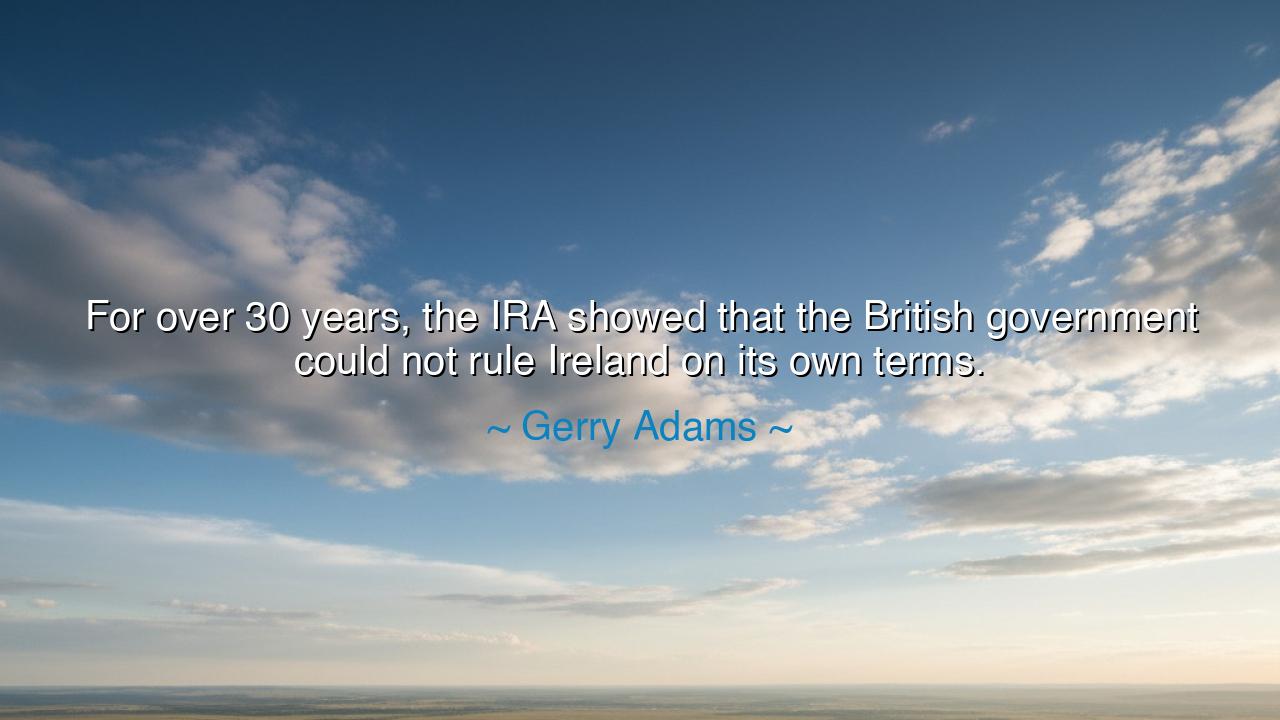
For over 30 years, the IRA showed that the British government
For over 30 years, the IRA showed that the British government could not rule Ireland on its own terms.






When Gerry Adams declared, “For over 30 years, the IRA showed that the British government could not rule Ireland on its own terms,” he was not glorifying conflict — he was marking a truth carved in blood, endurance, and defiance. His words rise from the long shadow of a divided land, a land that has known conquest and resistance for centuries. Adams, a political leader who emerged from the storm of The Troubles, spoke as one who had seen both the cost of violence and the price of submission. His statement reflects not merely the history of Ireland’s struggle, but a deeper and universal truth — that a people’s spirit cannot be governed by decree, nor subdued by the laws of an occupying power.
The origin of this quote lies in the turbulent history of Northern Ireland, from the late 1960s to the 1990s — an era known simply as The Troubles. During this time, the Irish Republican Army (IRA), claiming to fight for the reunification of Ireland and an end to British rule in the North, waged a relentless campaign of armed resistance. The British government responded with military force, internment, and intelligence operations. Cities like Belfast and Derry became battlefields. Streets turned to barricades. Families lived under the constant hum of helicopters and the fear of explosions. Yet, despite decades of suppression, arrests, and propaganda, the IRA endured. Adams’ words capture the paradox of that endurance: even in defeat, the movement proved its point — that Ireland could not be ruled “on British terms,” without Irish consent, without Irish will, and without Irish identity rising again and again from the ashes.
To understand the weight of his declaration, one must grasp what those “terms” meant. For centuries, British rule in Ireland had been marked by policies of domination — political, cultural, and religious. The Irish were told what to speak, how to worship, and whom to obey. Even after partial independence in 1922, Northern Ireland remained under British control, governed largely by a Protestant minority that wielded power over a Catholic nationalist majority. The government’s “terms” were, in essence, the continuation of inequality. But when the civil rights movement began in the late 1960s — inspired by similar struggles in the United States — and was met with violence and state repression, the conflict deepened. The IRA’s campaign, brutal as it was, became a symbol that a people denied equality will not rest in quiet obedience.
Consider the story of Bloody Sunday, January 30, 1972 — a day when British soldiers opened fire on unarmed civil rights marchers in Derry, killing fourteen. That single moment became a fire that ignited generations. The event shattered any illusion of fairness under British authority. It proved to many Irish that reform would not come from negotiation alone. It was in this crucible that Adams’ perspective was forged. Whether one agrees with the methods or not, his words are a recognition of what history revealed: that power imposed without justice breeds resistance without end.
Yet Adams’ quote is not a call to eternal rebellion, but a reflection on transformation. Over time, even those who fought with rifles came to understand that true victory is not merely political, but moral — the freedom to decide one’s own destiny without hatred or domination. The IRA’s persistence forced the British government to the table, leading eventually to the Good Friday Agreement of 1998, which brought peace and a new form of shared governance. In this sense, Adams’ words can be read as both a statement of resistance and an acknowledgment of evolution — that strength of will can pave the road to dialogue, and that dignity, once defended, becomes the foundation of peace.
In the broader sense, his message transcends Ireland. It speaks to all peoples and nations that have struggled against the weight of foreign rule, injustice, or imposed order. No government, however powerful, can long endure when it rules without legitimacy. From India’s nonviolent resistance under Gandhi, to South Africa’s fight against apartheid, history affirms the same truth: freedom cannot be administered — it must be lived, claimed, and earned by those who refuse to bow. Adams’ words echo the ancient truth that power may dominate bodies, but it can never conquer the human will when that will is bound to the idea of self-determination.
The lesson is profound and eternal: authority without consent is brittle; control without justice is doomed. Every generation must decide how to confront the powers that shape it — with wisdom, courage, and conscience. For the Irish, the struggle was to remind the world that even the smallest nation, when bound by unity and conviction, can make empires tremble. For us all, the teaching is clear: peace built on suppression is a peace already crumbling. Only through fairness, respect, and the recognition of human dignity can nations truly be at rest.
So let this truth be passed down: no nation can rule another’s soul. The fires of resistance may smolder or burn, but they are kept alive by the same force that built every civilization worth remembering — the unyielding demand to be free, to be heard, and to live under laws of one’s own making. Gerry Adams’ words remind us that the spirit of a people, once awakened, cannot be governed — it can only be respected, or it will rise again to claim its rightful place in the sun.






AAdministratorAdministrator
Welcome, honored guests. Please leave a comment, we will respond soon